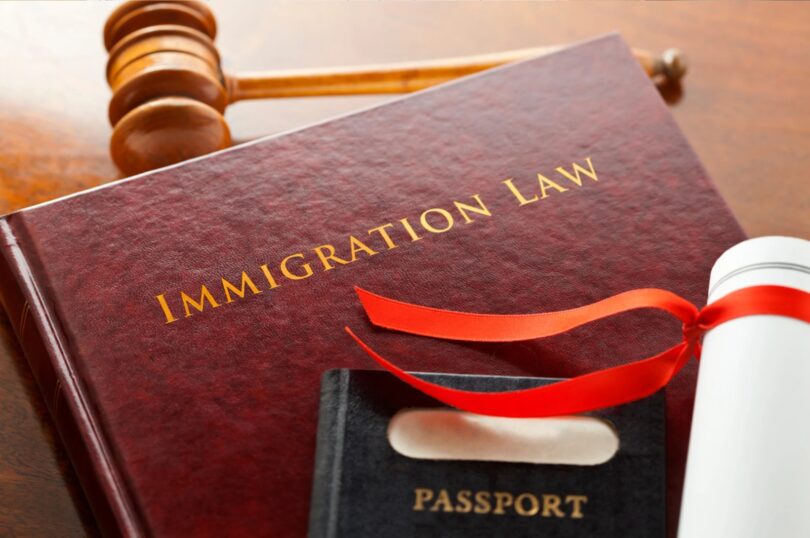Advertisements
The U.S. government has introduced a new immigration policy that mandates undocumented immigrants who are 14 years and older to register with federal authorities. This initiative aims to tighten immigration enforcement and improve national security.
In his new executive order “Protecting the American People Against Invasion”, President Trump directed the Department of Homeland Security (DHS) to implement a long-existing but overlooked national rule which directs that all aliens must be registered with the United States government.
The DHS will then go ahead to issue evidence of registration to aliens who have registered and fingerprinted (unless waived). Registered aliens who are above 18 years must be in possession of their evidence at all times.
Understanding the New Registration Requirement
The Alien Enrollment which is also known as the Alien Registration is a requirement put in place for non-citizens in the United States to adhere to. This requirement means that all undocumented immigrants living in the U.S. must officially register with the federal government. It is a strategy which helps to notify the US government of your presence in the country. The Department of Homeland Security (DHS) now requires all immigrants who have not been documented in the U.S. to register with the federal government. For this process:
- Immigrants are expected to provide their personal details, such as name, address, and fingerprints.
- It is mandatory for individuals who are 14 years and above to register.
- Parents or guardians will be responsible for registering children who are under 14.
- Individuals who are 18 years and above must carry a proof of registration at all times.
The policy is being implemented to strengthen immigration enforcement and monitor undocumented residents more closely.
Consequences of Non-Compliance
Failure to register carries serious penalties:
- Fines: If you fail to comply with the enrollment process, it could lead to you paying a fine of up to $5,000.
- Imprisonment: It could also lead to defaulters being imprisoned for a period of about six months.
These measures underscore the administration’s commitment to enforcing immigration laws.
Historical Context
It is important that you know this policy isn’t entirely new. It revives provisions from the Alien Registration Act of 1940 and the Immigration and Nationality Act of 1952, which required non-citizens to register with the government. However, these laws were not usually enforced in recent decades.
Implementation and Enforcement
The United States Citizenship and Immigration Services (USCIS) is responsible for overseeing the registration process. They will establish an online system that will be made available for aliens to register on. The Department of Justice has indicated that it will prioritize cases involving individuals who fail to comply. This action is geared towards intensifying the enforcement strategy.
Advertisements
Who Needs to Enroll
The enrollment requirement specifically targets undocumented immigrants who are living in the United States. Let’s take a closer look at those who need to enroll:
- Individuals Aged 14 and Above: All undocumented immigrants who are within this age bracket are required to register. This means immigrants who were not registered and fingerprinted when applying for a visa to enter the United States and are going to stay in the United States for 30 days or longer than that. They must apply for the alien registration before the expiration of the 30 days.
- Parents or Guardians of Minors Under 14: While children under 14 are not required to register themselves, their parents or legal guardians must register on their behalf. If they have not been registered before and are going to stay for 30 days or more, the parents or guardians are to register them before the end of the 30 days.
- All aliens who turn 14 years old in the United States must apply for the alien registration within 30 days after their 14th birthday. It does not matter if they have previously registered or not.
Any immigrant who has not been issued any of the documents pointed out as evidence of registration under 8 CFR 264.1(b) and has not submitted one of the forms marked out at 8 CFR 264.1(a) and have also not provided fingerprints (unless waived) is not registered. Individuals who fall under the following categories are also not registered:
- Immigrants who are currently in the United States without inspection and admission or inspection and parole
- Canadian visitors that got into the US through land border crossings and were not issued any evidence of registration
- And also, candidates for Deferred Action for Childhood Arrivals (DACA) and Temporary Protected Status who were not issued any official enrollment evidence.
Details to Provide During Enrollment:
You will need to present some personal details during the process of your enrollment. These details include:
- Your Full Name
- Your Current Residential Address
- Your Fingerprints
Additionally, individuals aged 18 and above must carry proof of registration at all times. If you fail to do this, you may attract some penalties to yourself.
Who Are Those Already Enrolled
Prior to this mandate, certain groups of non-citizens were already required to register with the U.S. government:
- Legal Permanent Residents (Green Card Holders): Individuals with lawful permanent residency have been part of federal records.
- Visa Holders: Individuals who were granted immigrant or nonimmigrant visas before their arrival to the US. Those on student, work, or tourist visas have their information recorded upon entry into the U.S.
- Those whom the Department of Homeland Security (DHS) have placed into removal proceedings.
- Individuals who were paroled into the United States under INA 212(d)(5). Their enrollment still stands even if their period of parole has expired.
- Aliens who have been issued Border Crossing Cards.
- Those that applied for lawful permanent residence using Forms I-485, I-687, I-691, I-698, I-700, have been registered even if their applications were denied.
- Individuals who were issued an employment authorization document
- Aliens who were allowed to enter the United States as nonimmigrants and were issued Form I-94 or I-94W (paper or electronic). Even if their period of admission has expired, their enrollment is still valid.
Bear it in mind that these groups are not the primary focus of the new enrollment mandate, as they are already documented within federal systems.
How to Enroll
A complete registration process has not been made available yet but will soon be announced by the Department of Homeland Security (DHS). However,
- Starting February 25, 2025, aliens who need to enroll are to create a USCIS account as they await the registration process.
Note: The alien enrollment or alien registration does not automatically confer immigration status on registered aliens and registration documentation also does not appoint employment authorization or any of the rights or benefits under the INA or any other United States law.
Frequently Asked Questions (FAQs)
-
Who is required to register?
All undocumented immigrants aged 14 and older residing in the U.S. are required to register. Parents or guardians must register children under 14.
-
How do I register?
USCIS will provide an online system for registration. Details will be announced on their official website.
-
What information is required for registration?
You will need to provide personal details, including your name, current address, and fingerprints.
-
What happens if I don’t register?
Non-compliance can result in fines up to $5,000 and imprisonment for up to six months.
-
Will the information I provide be used for deportation?
The administration has stated that the registry is for enforcement and security purposes, but critics fear it could be used to identify individuals for deportation.
-
How will this policy affect my daily life?
Registered individuals over 18 must carry proof of registration at all times. Failure to do so could result in penalties.
-
Is this policy permanent?
The policy is currently in effect, but its permanence depends on future administrative and legislative actions.
-
Where can I find more information?
You can visit the USCIS website or contact local immigration support organizations for more official updates.
Conclusion
The new U.S. immigration enrollment law is a significant policy change that affects undocumented immigrants across the country. Due to the strict penalties that come with non-compliance, it is very necessary for affected individuals to complete the enrollment process, and obtain proof of registration to avoid legal consequences.
If you or someone you know is required to enroll, don’t waste any more time, follow the necessary steps, and ensure you comply with the law. Immigration policies can change rapidly so it is very important that you are equipped with the latest updates.
Advertisements



